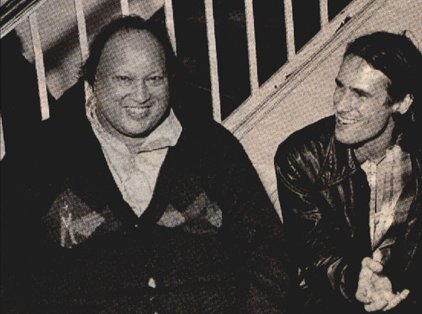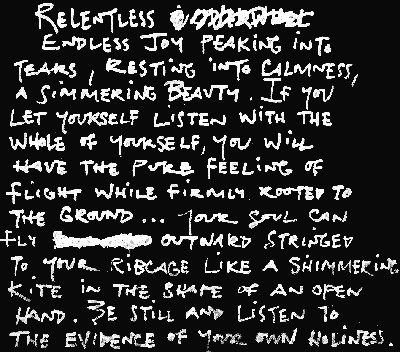|
The first time I heard the voice of Nusrat Fateh Ali Khan was in Harlem,
1990. My roommate and I stood there, blasting it in his room. We were all
awash in the thick undulating tide of dark punjabi tabla rhythyms, spiked
with synchronized handclaps booming from above and below in hard, perfect
time.
I heard the clarion call of harmoniums dancing the antique melody around
like giant, singing wooden spiders. Then all of a sudden, the rising of
one, then ten voices hovering over the tonic like a flock of geese
ascending into formation across the sky.
Then came the voice of Nusrat Fateh Ali Khan. Part Buddha, part demon,
part mad angel...his voice is velvet fire, simply incomparable. Nusrat's
blending of classical improvisations to the art of Qawwali, combined with
his out and out daredevil style and his sensitivity, outs him in a
category all his own, above all others in his field.
His every enunciation went straight into me. I knew not one word of Urdu,
and somehow it still hooked me into the story that he weaved with his
wordless voice. I remember my senses fully froze in order to feel melody
after melody crash upon each other in waves of improvisation; with each
line being repeated by the men in the chorus, restated again by the main
soloists, and then Nusrat setting the whole bloody thing alflame with his
rapid-fire scatting, turning classical Indian Solfeggio (Sa, Re, Gha, Ma,
Pa, Dha, Ni) into a chaotic/manic birdsong. The phrase burst into a climax
somewhere, with Nusrat's upper register painting a melody that made my
heart long to fly. The piece went on for fifteen minutes. I ate my heart
out. My roommate just looked at me knowingly, muttering,
"Nusrat...Fa-teh...A-li...Khaaan," like he had just scored the wine of the
century. I felt a rush of adrenaline in my chest, like I was on the edge
of a cliff, wondering when I would jump and how well the ocean would catch
me: two questions that would never be answered until I experienced the
first leap.
That is the sensation and the character of Qawwali music, the music of the
Sufis, as best I can describe it.
 In between the world of the flesh and the world of the spirit is the void.
The Qawwali is the messenger who leaps empty-handed into the abyss and
returns carrying messages of love from the Beloved (Allah). These messages
have no words, per se, but at the high point of a Qawwali performance,
they come in bursts of light into the hearts and minds of the members of
the audience. (Of course, by that time the whole house is either hanging
from the rafters, or dancing.) This is called Marifat, the inner
knowledge, and it is in the aim of the Qawwali tradition to bring the
listener into this state: first through the beauty of the poetry and the
weight of its meaning; then, eventually, through the Qawwali's use of
repetition; repeating the key phrases of the poem until the meaning has
melted away to reveal the true form to the listener. I've seen Nusrat and
his party repeatedly melt New Yorkers into human beings. At times I've
seen him in such a trance while singing that I am sure that the world does
not exist for him any longer. The effect it has is gorgeous. These men do
not play music, they are music itself.
In between the world of the flesh and the world of the spirit is the void.
The Qawwali is the messenger who leaps empty-handed into the abyss and
returns carrying messages of love from the Beloved (Allah). These messages
have no words, per se, but at the high point of a Qawwali performance,
they come in bursts of light into the hearts and minds of the members of
the audience. (Of course, by that time the whole house is either hanging
from the rafters, or dancing.) This is called Marifat, the inner
knowledge, and it is in the aim of the Qawwali tradition to bring the
listener into this state: first through the beauty of the poetry and the
weight of its meaning; then, eventually, through the Qawwali's use of
repetition; repeating the key phrases of the poem until the meaning has
melted away to reveal the true form to the listener. I've seen Nusrat and
his party repeatedly melt New Yorkers into human beings. At times I've
seen him in such a trance while singing that I am sure that the world does
not exist for him any longer. The effect it has is gorgeous. These men do
not play music, they are music itself.
 The texts from which traditional Qawwals are sung come from the works of
the great sufi poets: Bulle Shah (1680-1753), Shams Tabrez (d. 1247), Shah
Hussain (1538-1599), and the great Sufi poet and scholar, Amir Khusrav
(1253-1325), who was the inventor of Qawwali itself. These texts are
devotional, of course, meaning poems of worship for Allah (Hamd) and the
prophet Muhammad (N'ati-Sharif). There are also love poems (ghazals),
where a more secular romantic interplay is happening between man and woman
(which I can dig). The Qawwali's, however, see ghazals as a metaphor
between Man and the Divine. They don't care about which meaning was
derived from where. In the true Sufi way, through their music, any meaning
that is needed by the listener is there for the listener to absorb. For
the true Qawwali, all meanings of the music exist simutaneously and there
is no need of purpose for religious dogma. There is only the pilgrimage to
the light within the heart, which is the home of God. There is only a pure
devotion and a fierce virtuosity to grow wings and soar through music. To
plant a kiss on the eyes of Allah and then sing His loving gaze back home into
the hearts of Man.
The texts from which traditional Qawwals are sung come from the works of
the great sufi poets: Bulle Shah (1680-1753), Shams Tabrez (d. 1247), Shah
Hussain (1538-1599), and the great Sufi poet and scholar, Amir Khusrav
(1253-1325), who was the inventor of Qawwali itself. These texts are
devotional, of course, meaning poems of worship for Allah (Hamd) and the
prophet Muhammad (N'ati-Sharif). There are also love poems (ghazals),
where a more secular romantic interplay is happening between man and woman
(which I can dig). The Qawwali's, however, see ghazals as a metaphor
between Man and the Divine. They don't care about which meaning was
derived from where. In the true Sufi way, through their music, any meaning
that is needed by the listener is there for the listener to absorb. For
the true Qawwali, all meanings of the music exist simutaneously and there
is no need of purpose for religious dogma. There is only the pilgrimage to
the light within the heart, which is the home of God. There is only a pure
devotion and a fierce virtuosity to grow wings and soar through music. To
plant a kiss on the eyes of Allah and then sing His loving gaze back home into
the hearts of Man.
-Jeff Buckley, New York, 1997
| 




